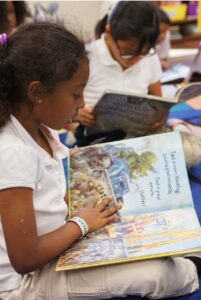Across the country, lawmakers in red and red-leaning states have enacted expansive school-choice laws.
Arkansas, Iowa, Utah, Florida, Arizona, West Virginia, and North Carolina have adopted universal school-choice programs that allow parents to use government-funded education savings accounts to help fund their education expenses, including private-school tuition.
It is often assumed, however, that parents and students in blue states are out of luck when it comes to choosing a private school that better fits their needs. That assumption, though, does not apply to all students.
In deep blue California, which is dominated by anti-choice politicians in Sacramento, many students from lower-income families in the San Francisco Bay Area have succeeded in school and in life thanks to the scholarships offered by the BASIC Fund.

The BASIC Fund is a private organization that provides needs-based scholarships to lower-income students from pre-K to 8th grade so they and their parents can choose from more than 240 private schools in the Bay Area.
The scholarships are awarded first-come first-serve on the basis of financial need. According to BASIC, “The awards are based on household size and income, covering anywhere from 25-75% of a school’s tuition, up to $2,500 per student per year.” Parents are asked to pay a portion of tuition in order to ensure that they have a stake in their children’s education.
BASIC, which is celebrating its 25th anniversary this year, has raised and dispersed over $155 million in scholarships that have gone to support more than 26,000 lower-income students. All funds raised go to scholarships, with administrative costs covered by the organization’s board.
Have these scholarships succeeded in changing the trajectory of recipients’ lives? The answer is a resounding “yes.”
Too many public schools, especially in low-income areas, have become failure factories, which causes many students to drop out of school altogether.
In the San Francisco Bay Area, for example, a quarter of public high school students fail to graduate.
Among students receiving BASIC Fund scholarships to attend higher performing private schools, the graduation rate is an astounding 98 percent.
Further, while only a little more than six out of 10 high school graduates nationwide go on to post-secondary education, 92 percent of BASIC Fund students go on to higher education.
Perhaps the most important comparison between public school students and BASIC students is their difference in college-degree attainment.
Among lower-income students nationwide, 11 percent graduate from a four-year college. In contrast, nearly five times more BASIC students—53 percent—graduate with a degree from a four-year college.

BASIC leaders say that their model works so well because they guarantee stable funding for students, funding the tenure of the student in the program, and funding all siblings in a family.
Further, the scholarships allow for early support for children’s education, which means they are receiving high academic engagement in structured classrooms in safe environments that lay the foundation for later success.
Beyond the statistics, the individual stories of BASIC scholarship recipients underscore why school choice works and why it is needed.
Markel Banks, an African-American student at Saint Ignatius College Preparatory, says, “The BASIC Fund has helped me be able to afford a private school.” She has high goals, including becoming a judge. “I see me sitting in my own courtroom as the honorable Judge Banks,” she says with a smile, and while she will face obstacles she is grateful for her scholarship that allowed her to overcome those challenges.

The dreams of BASIC students often come true. At a recent luncheon celebrating the organization’s quarter-century anniversary, Julio Barrientos spoke about how the scholarship he received changed the course of his life. He went from growing up in challenging circumstances to graduating from the University of Southern California and then becoming a successful vice president at a large bank.
Rachel Elginsmith, the CEO of BASIC Fund, says, “My ultimate wish is for a quality safe education for every child in the Bay Area.” She says that she has the best job in the world and “it makes you want to give back and makes you want to give choices to other people.”
California policymakers should learn a lesson from the success of the BASIC Fund and give all children in the state the same opportunities that BASIC has given to its recipients. School choice should be an option for all parents and their children.
Lance Izumi is senior director of the Center for Education at the Pacific Research Institute. He is the co-author of the 2023 PRI book The Great Parent Revolt.

